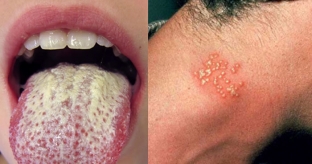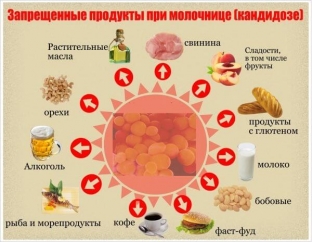Candida can infect mucous membranes, nails, internal organs and skin. Fungi of this genus are conditionally pathogenic, that is, they can be present in the human body without causing any health problems until favorable conditions arise for the reproduction and activity of such microorganisms. As a result, a disease called candidiasis develops. What factors contribute to the appearance of candidiasis, as well as what nutritional principles must be observed in the case of this disease, estet-portal.com will tell in this article.
What factors provoke diseases caused by the fungus Candida
The development of candidiasis in the oral cavity, nails, skin and vagina may be associated with a weakened immune defense or disturbances in the functioning of the body, including due to:
- diseases of the gastrointestinal tract;
- metabolic disorders;
- vitamin deficiency;
- severe illnesses;
- chronic infectious diseases;
- long-term taking of antibiotics and other medications;
- immunodeficiency conditions.
Weakened immune system, poor diet, various diseases and environmental factors can contribute to Candida activity.
The above causes are classified as endogenous, as for the impact of external factors, triggers for candidal lesions can be:
- combination of high temperature and high humidity (including due to the wrong choice of clothing);
- exposure to harmful chemicals;
- non-observance of hygiene rules;
- malnutrition;
- damage to the skin and mucous membranes, etc.

If you have not managed to avoid a Candida infection, in addition to the treatment prescribed by your doctor, you need to ensure proper nutrition. Therefore, estet-portal.com will tell:
- what foods should not be consumed with candidiasis;
- what foods will be useful for candidiasis.
What foods should be excluded from the diet if Candida is affected
To avoid promoting Candida fungus activity, try not to consume:
- Sugar and products containing sugar, as sweets will only make matters worse.
- Alcoholic drinks: firstly, they contain sugar, and secondly, alcohol reduces the protective function of the body, which is necessary to suppress the activity of the fungus.
- Dried fruits and fruit juices should also be avoided due to their high sugar content.
- Gluten because it promotes inflammation in the body and is eventually broken down in the body into sugars that the fungus feeds on.
- Starchy foods such as beans, potatoes, etc.
- Dairy and fermented foods, while promoting the growth of beneficial bacteria, can also contribute to inflammation. Therefore, you should not get carried away with such food in the midst of candidiasis.

Alcohol, sweets and starchy vegetables – main "assistants" fungus candida.
Foods to help the body fight Candida
For candida-friendly foods, these include:
- coconut oil (the fatty acid in this oil can inhibit the growth of the fungus and lead to the cessation of its vital activity);
- garlic (allicin is an excellent antifungal agent that will help the body from the inside);
- apple cider vinegar (in addition to other useful properties of this product, experts highlight its ability to fight fungus);
- all types of cabbage, radishes and arugula also kill Candida due to their isothiocyanate content;
- Ginger root has a host of health benefits, including anti-inflammatory and antifungal properties, as well as strengthening immune defenses;
- vegetable oils (olive, flax, avocado and primrose) are rich in antioxidants;
- cloves and cinnamon – these spices perfectly suppress the growth of the fungus and kill it; clove oil can also be applied, for example, to skin lesions by fungus;
- Lemon juice is excellent for supporting the liver, which plays an important role in the fight against candidiasis;
- wild salmon, which is rich in omega-3s necessary for the body.
It must be remembered that the approach to the fight against fungi of the genus Candida must be comprehensive. First of all, you need to get a prescription from a doctor for special antifungal drugs (depending on the location of the lesion) and follow his recommendations. And proper nutrition will help not only eliminate the fungal infection, but also prevent its recurrence.






Add a comment